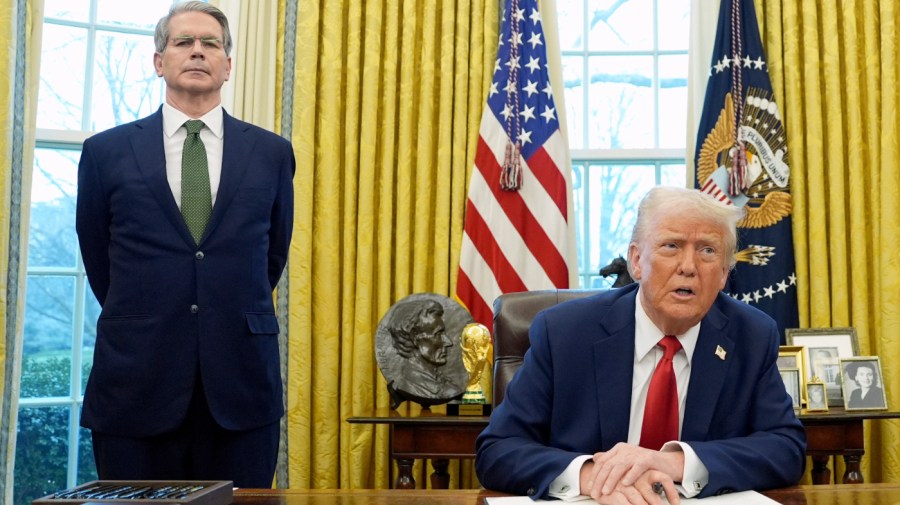3 warning signs about the future of government oversight

President Trump has cleared 18 public inspectors to remove independent monitoring of almost all cabinet agencies, including me and many long weapons in the control community.
The alleged justification (as mentioned in the White House emails that launched us) was due to “Trump’s priorities”. But many have argued that it reflects something more evil: the desire to be beheaded and so much that they could not conduct a significant supervision.
Here are three warning signs that will tell you whether we are the proverb in the charcoal mine.
The first brand is how the White House deals with later seats with inspectors of the Public Prosecution. The current law states that if the general position of the inspector becomes vacant, then the first assistant assumes the role of the Acting Inspector General. These first assistants are usually deputy general inspectors, who are huge government employees dedicated to delivery of waste, fraud and ill -treatment within their agencies.
But in his first administration, Trump named the political appoinals in those representative roles. This means that they were wearing two caps – one of which implements the policies of the administration and the other supervises these particular programs.
However, the so -called “double glove” represents an inconceivable and uninterrupted conflict. How can the official see that it measures the agency’s programs fairly and independently when they are filled with political leadership of their jobs, not to mention their salaries and rewards?
Unlike the Inspector General, whose salary was identified under the statute and who cannot obtain a reward, these dual officials will have an inevitable incentive to summon balls and strikes for their president. In fact, the possibility cannot be defended to the extent that Congress has banned such a public dates of the inspector in 2022, specifically due to these conflicts of interests.
But given that the White House ignored the legal requirements on the 18th of the shooting a few weeks ago, it is not an extended to ignore other legal requirements in naming the inspectors on behalf of them now.
So why is the name of the political appointed as inspected by bilateral acts as a warning sign? In short, management agents will have the ideals of the Kingdom.
They will control the ongoing investigations, which means that they can eliminate legitimate investigations in their peers and administrative colleagues. They can access sensitive and confidential information for those whose violations, including individuals who may have submitted complaints against them, and can alleviate negative results of audit and evaluations related to their own programs.
Moreover, even if these appointed people work in good faith and others in any of these violations, the oversight reports issued according to their signature will be of limited value, they are removed as results from the political operative that causes the administration. As such, they will definitely lack the credibility necessary to make a positive change.
Therefore, here is the warning mark: So-, despite these clicks of indomitable problems-the White House appointed dual-owned administration officials as insulting inspectors, it will be a clear sign that the administration is not interested in meaningful control in the federal government.
The second warning sign is the ideal internal ball issue, but it is worth discussing, as it can be a harbinger about the future of government control.
According to the Inspector General Law, the general inspectors under the “general supervision” of the head of the agency are subject to the head of the agency; This term has always been interpreted by previous presidential courts and departments as “nominal”. The law also explicitly states that the agency’s head cannot “prevent or prohibit the Inspector General from starting, implementing or completing any scrutiny or investigation, or from issuing any calling order during any scrutiny or investigation.”
Combating, these legal provisions prove that the general inspectors are part of their agencies and inform the heads of those agencies, on the one hand, but at the same time it proves that supervision contradicts the general act of the inspector when it indicates their independence and their ability to carry out their jobs, on the other.
Therefore, for example, if an agency adopts wide security bases to enter its buildings or minimal standards for information technology systems under the agency’s umbrella, the public offices will be generally subject to those restrictions. These types of broad, routine and administrative delegations and do not affect their ability to perform their functions.
However, the agency’s heads may not inform their general inspectors of stopping an investigation into a political official or changing the scope or results of the audit in a political sensitive program. Those who were cut into the essence of the independence of the International Energy Agency, and therefore they are not extended under the Inspector General Law.
The warning mark here is whether the executives officials are adopting a wide explanation that is not due to “general supervision” and the expansion of the definition behind anything we saw in the history of the 45 -year -old inspectors. Will the head of the agency, despite the clear provisions, on the contrary, try to exercise their supervisory authority to control the results and recommendations of the Inspector General? Again, this will be a sign that the administration is not interested in independent supervision.
The final warning sign is the one who nominates the president to vacant positions on a permanent basis.
The general inspectors were created to be fair, objective and independent residents of the agency’s programs. The essence of this independence is that they are not the debtors of a political actor, party or ideology. In short, they cannot have a share in their control results.
So, the main warning mark here is whether the White House provides the general nominations to the inspector that has wallpapers that would cause a reasonable person to doubt his credibility. Basically, do candidates have wide partisan political experience, major political donations, or leadership in ideological or party groups, or data in speeches, or social media publications that make the American public think they are not listed in a row?
This does not mean that individuals who have such backgrounds cannot be general inspectors, but they must raise red flags in Congress and with the American people about their willingness to conduct fair, objective and independent supervision.
The main question for all inspectors general candidates is: Do they have anything in their background that would indicate that they will put their thumb on the scale in favor of a political party or another?
Combating, these three elements of the American public will appear whether the Trump administration is serious about federal control.
It will tell time, but if the White House appoints double politicians who suffer from Acting Inspectorrs, it emphasizes a wide, undesirable interpretation of “general supervision” of public inspectors or nominating political lackeys on open positions, and we will know that the general inspectors were just Canary in the currencies.
Mark Greenblatt was the Inspector of the Ministry of Interior in the United States from August 2019 to January 2025. He also held the position of Speaker of the General Inspectors on Integrity and Efficiency from 2023 to 2024 and Vice -President from 2022 to 2023.




Post Comment